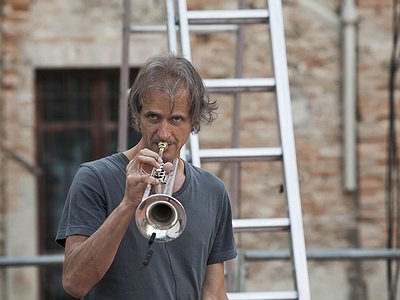Part 2
With more and more musicians creating than ever and more and more of these creations being released, what does this mean for you as an artist in terms of originality? What are some of the areas where you currently see the greatest potential for originality and who are some of the artists and communities that you find inspiring in this regard?
Difficult questions for me … I just follow my own inspiration. It is clear to me that 99% of the music created today I cannot hear or follow. That is a real pity, but each day has only 24 hours, and if you play, teach, travel and have a family little time is left for connecting and listening to all the fantastic music around.
How would you define the term “interpretation”? How important is it for you to closely work together with the artists performing your work?
Rarely my music is played by others. Most compositions I wrote involving myself and dear friends, sometimes orchestras, to whom I can explain my vision. First, everything has to be played right, as conceived, and then the player can take freedom. But to take freedom in the interpretation before being able to play the piece right is dangerous. I say this from my long experience of interpreting classical and contemporary music, mostly my father’s. With him a close relation between composer – interpreter was essential.
The effect of a piece doesn't merely depend on the performance of the musicians, but also on the place it is performed at. How do you see the relationship between location and sound? In how far do you feel the current system of concert halls is still the right one for your music – or for contemporary music in general?
I have learned to adapt to all kinds of locations and situations. Every time the music is shaped by the vibration of the room and also the atmosphere of the people around you, organizers, technicians and then the public. With Tara Bouman for instance, in our duo MOVING SOUNDS we mostly perform intuitive music in churches or spaces with good and reverberating natural acoustics. There our music is really created in interaction with the room. We play the room.
Normally good concert promoters nowadays are very aware of the music they schedule and carefully select the musicians and the performance spaces. I think here we have seen great progress. As a boy I witnessed my father performing in the German pavilion of the EXPO ‘70 at Osaka, Japan. My father’s music was performed six hours every day, for six months. I was there a month. The spherical auditorium had 49 loudspeakers below, around and above the listeners. My father had designed this room together with the architect. It was a spectacular sound space, I have never since experienced anything like this.
It has become a high art to conceive modern concert halls with good acoustics. For instance in Pecs, Hungary, the relatively new concert hall has outstanding acoustics. When I stood on stage – together with my friend, the guitar player Ferenc Snétberger - and played a note, my instrument sounded like never before. I was able to play effortlessly. The Budapest Music Center is also a very nice example of how musicians created a whole house with different halls, recording facilities, rehearsal spaces and much more, on the highest level of what’s possible today.
What's your view on the role and function of music as well as the (e.g. political/social/creative) tasks of composers today - and how do you try to meet these goals in your work?
I am not a political person. I believe that each human being should live in harmony with his or her inner being. Then we would have no wars, no collective struggles. Living in harmony with yourself also implies harmony with all beings around you and also mother nature. (Difficult though when you sit in an airplane and know that you are polluting the air, like me right now.)
When each person, and this is true for musicians as well, follows his/her inner call, then music is being created that serves the whole world adequately. Because we all are connected, even if mentally we don’t know it, but energetically and in consciousness we are. Personally I like to make music that leads the listener to himself / herself, gives peace, balances out all energies.
Do you have a musical vision that you haven't been able to realise for technical or financial reasons – or an idea of what music itself could be beyond its current form?
My dream has been that the listener would awaken, or at least be inspired, even if only by a single note. But we all are different, and only those who are in resonance with themselves will feel the deeper level of the music. But this is still my ideal: to be able to play in a way that the listener is transformed. This has been the true meaning of music since its origins. Music for spiritual uplifting. But most people (just) want to be entertained or excited.
I would like to found a center of sound research for music and spiritual teaching through music. I haven’t found the right place and the resources yet … everything has it’s time, as it has been said …






